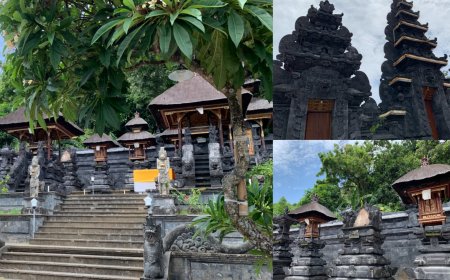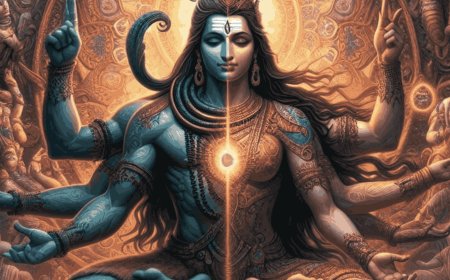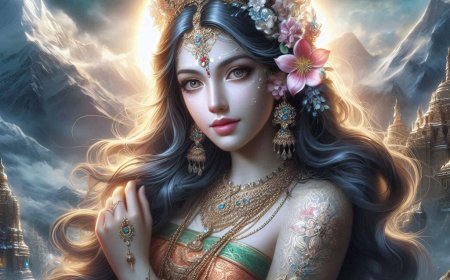Stri Parwa: The Sorrowful Story Behind the Victory of Bharatayudha
Stri Parwa captures the profound grief of women following the Bharatayudha war. Despite the Pandavas' triumph, they are overshadowed by guilt and mourning. This narrative reveals that war brings only pain and sorrow, highlighting the emptiness of victory when so many lives are lost.
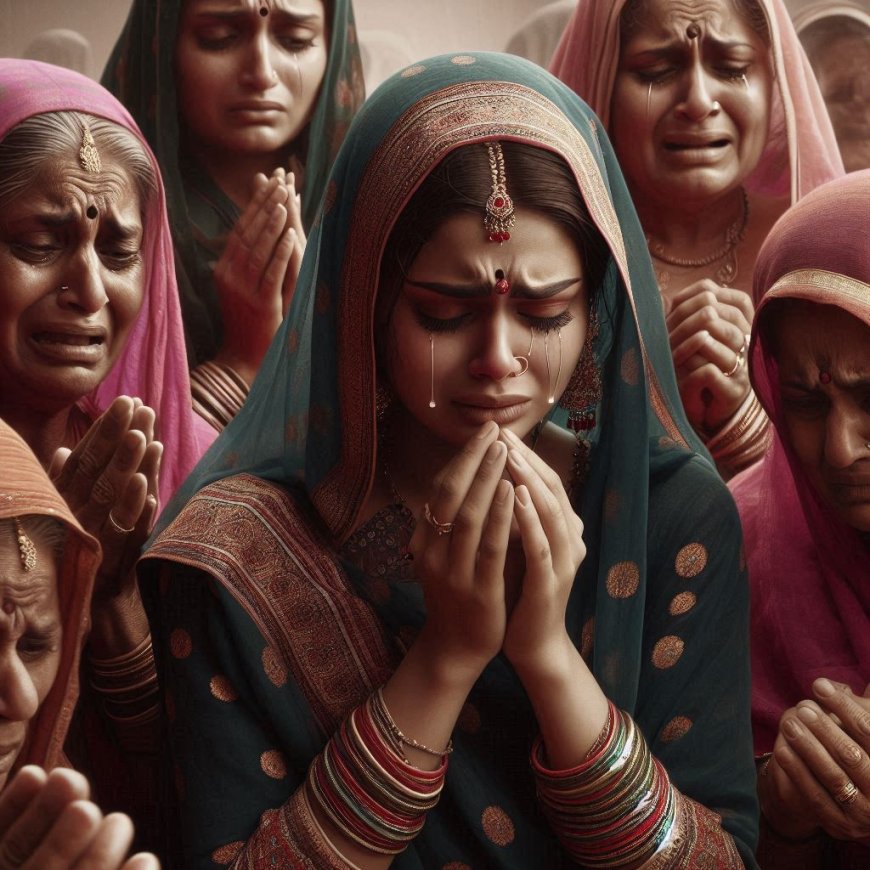
After the great war that shook the world, the Pandavas finally returned to their kingdom, bringing both victory and deep sorrow over the deaths of thousands of soldiers, and the 100 Kauravas along with their leader, Duryodhana, who was their own cousin. The victory felt bittersweet as every step towards the palace was accompanied by memories of the lives that had been sacrificed. Along the journey, the sight of the Pandavas was the women from the Kaurava family and their allies, mourning the profound loss of husbands, fathers, children, and brothers who had left with enthusiasm but never returned, leaving only memories and sadness on the brutal battlefield.
Upon arriving at the palace, Yudhishthira, along with Bhima, Arjuna, Nakula, and Sahadeva, cautiously approached their blind uncle, Dhritarashtra, the father of the Kauravas. They carried a heavy burden in their hearts, hoping to seek blessings and ask for forgiveness for what had transpired. However, once they stood before him, Dhritarashtra could not contain the anger and sorrow burning within him. The defeat of his children in battle had shattered his soul. With a trembling voice, he asked Bhima to come closer and embrace him. Though his words sounded gentle, there was hidden anger behind them. As Bhima was about to step forward, Vasudeva Krishna immediately whispered a warning to him. “Do not approach him,” he said softly but firmly. Krishna then created a statue before Dhritarashtra, replacing Bhima.
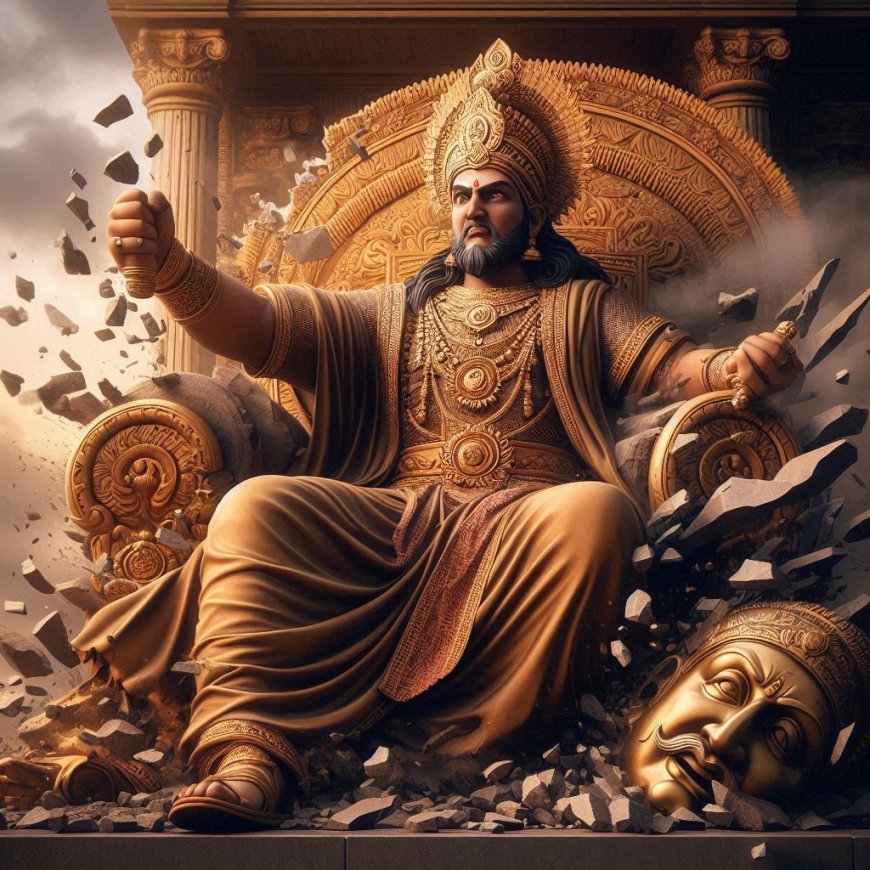
Dhristarashtra destroyed the statue he thought was Bhima (Source: Personal Collection)
Dhritarashtra shattered the statue, thinking it was Bhima. With trembling hands filled with vengeance, Dhritarashtra grasped the shoulder of the statue, believing Bhima was before him. In an instant, he unleashed the Gumbala Geni incantation, a deadly power he reserved only for Bhima. A loud crash was heard as the statue turned to ash, vanishing in moments. King Dhritarashtra immediately became aware. His chest felt tight, and tears began to well up in his eyes. A deep regret struck him as he realized that the burning vengeance had blinded him. With a sobbing voice, he begged for forgiveness, convinced that he had killed Bhima. However, Vasudeva Krishna, with his wise gentleness, placed a hand on Dhritarashtra's shoulder and said, “Calm down, Your Majesty. Bhima is still alive. What you destroyed was just a statue.” Upon hearing this, Dhritarashtra seemed to be reborn. His heart, filled with vengeance, began to melt, and he rushed to Bhima. With sincerity, he embraced Bhima tightly, tears still flowing down his face. “I forgive you, Bhima,” he said, his voice trembling, “and I hope you can forgive me too."
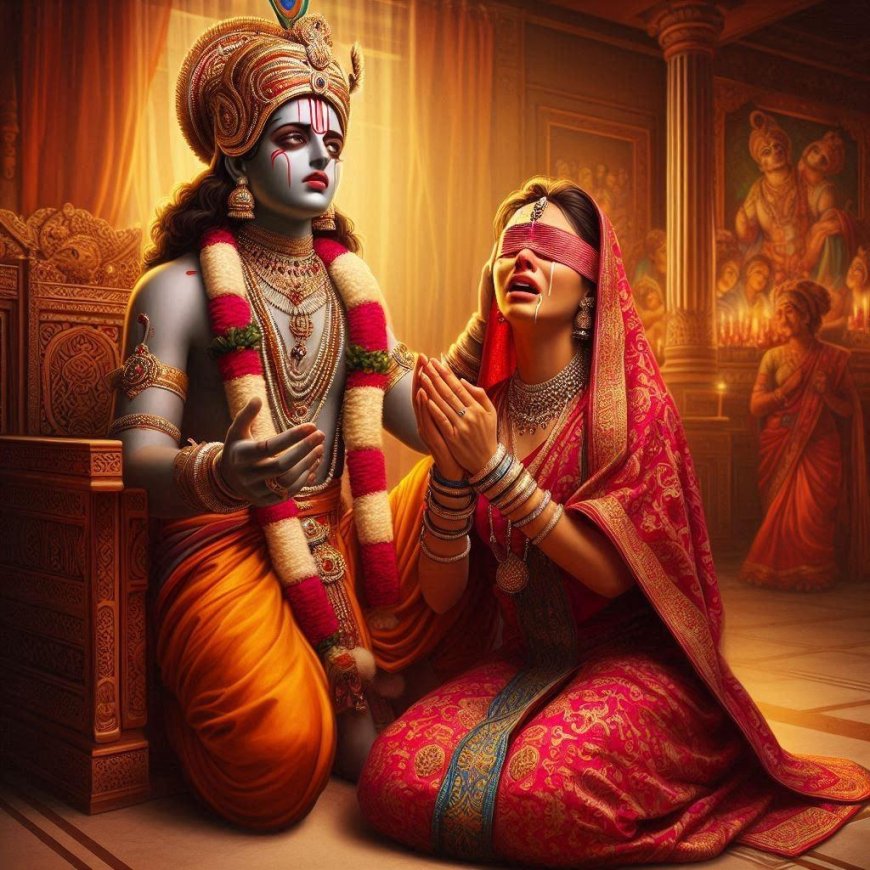
The figure of Gandhari, the mother of the Kauravas (Source: Personal Collection)
After hearing of the Pandavas' return, Gandhari, the mother of the hundred Kauravas, approached them with heavy steps. Her face was filled with unbearable sorrow, and in her eyes, anger burned. The pain she felt over the death of her children, especially Duryodhana, could no longer be hidden. Her heart was shattered, as if pierced by thousands of daggers that would never fade. With a trembling voice, full of wounds and anger, Gandhari stood before Krishna, the Vasudeva. “You… you are the great god, the ruler of everything that happens in this world!” she cried, tears flowing endlessly. “Why, Krishna? Why did you allow this war to happen? With the power you possess, you could have stopped it all. You could have saved my hundred children! But you chose to remain silent, choosing to watch this destruction!”
Gandhari, whose heart was broken by deep sorrow, raised her trembling hand and cursed Krishna. “For your inaction, Krishna, I curse you! Just as I have lost all my children, one day you will also lose your entire family. You will witness the downfall of the Yadava dynasty, and at that time, you will feel the same pain that I feel.” Krishna, who knew all this would happen, simply bowed his head. “Your curse, Gandhari, has been written in fate. I accept it, as it should be.” His voice was soft but full of meaning, with no anger or defense, only acceptance of the karma that was to come.
After the words of the curse were spoken, Gandhari realized what she had just done. In an instant, a wave of regret enveloped her heart. She had been consumed by deep vengeance and sorrow, forgetting the wisdom and compassion that had always been part of her. Her cries became more intense, her tears could no longer be held back. With a sobbing voice, she said to Krishna, “Vasudeva, forgive me… I have been consumed by my pain and vengeance. My heart is shattered by this loss, and in my anger, I cursed you. I should not have done that. You do not deserve to bear my vengeance. Forgive me, Krishna.” Krishna, who had always understood the pain and suffering of humanity, looked at Gandhari with deep tenderness. “Honorable Mother, I understand your feelings more than you can imagine. The loss of your hundred children is a wound that cannot be measured with words. Your heart is wounded, and in that wound, vengeful words may be unavoidable.” Gandhari sobbed even harder, understanding that although her pain would never fade, she was no longer alone in that suffering.
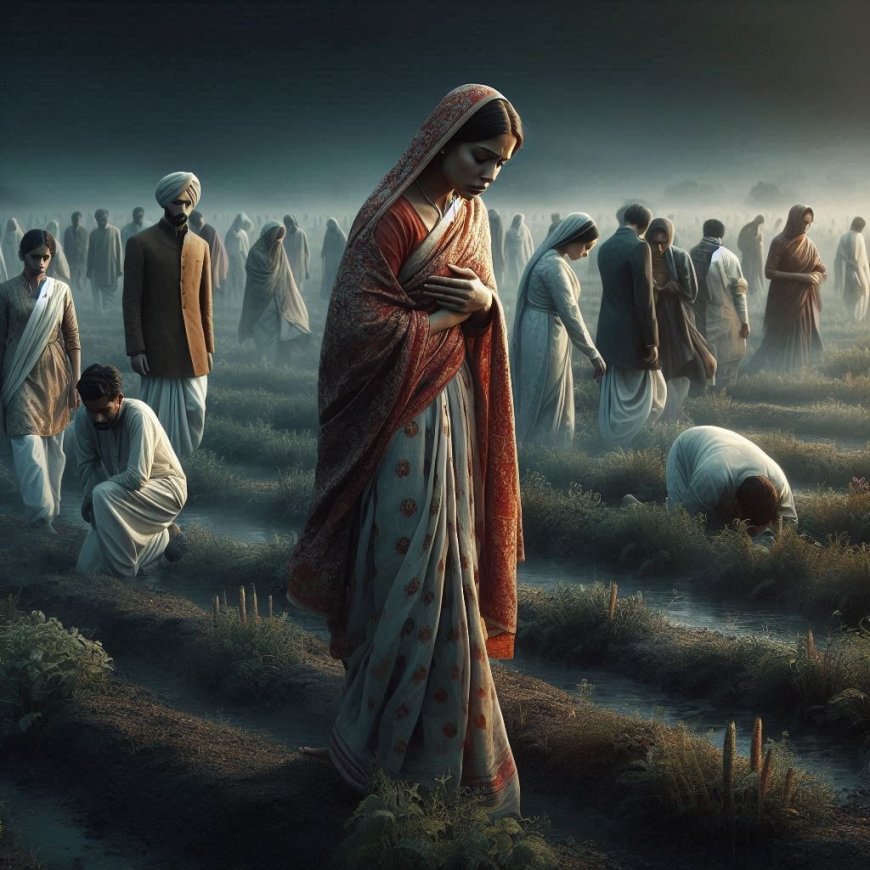
The people of Hastinapura remember the tragedy of the war in Kurukshetra (Source: Personal Collection)
The royal family of Hastinapura, along with thousands of citizens, set out for the battlefield of Kurukshetra. The journey was not only meant for the purification of the souls of the fallen heroes but also as a final farewell to those who lay on the battlefield. Among them were wives who had lost their husbands, mothers who had lost their children, and siblings who mourned the departure of their brothers, each step accompanied by grief. When they arrived at Kurukshetra, the land that had once witnessed the fierce battle, the sight before them was heartbreaking. The bodies of the warriors were still scattered, carrying memories of the fierce combat that had taken place there. Sounds of wailing and lamentation began to break the silence of the battlefield that had long been quiet. Among the scattered corpses, women wept with heart-wrenching voices. They mourned the past that they could never reclaim.
Drupadi, although on the winning side as the wife of the Pandavas, felt no joy. The war had taken too much from her. Brothers, children, and allies had fallen on the battlefield of Kurukshetra. Her tears flowed, not only for her family but also for every fallen hero, regardless of which side they were on. “This war,” whispered Drupadi, “has annihilated everything. There are no winners in such destruction.” Realizing the magnitude of the loss for the entire family, even Duryodhana's death left sorrow in her heart. With a trembling voice, Drupadi pleaded with her husband, “Let us pay our final respects, not only for our side but also for all the fallen warriors. They all deserve to be honored.” The Pandavas, moved by Drupadi’s request, realized that this war not only destroyed their enemies but also destroyed humanity itself.
Gandhari, with her eyes covered by cloth, felt the earth that was once trodden by her children who were now gone. Every step was filled with deep sorrow. All this time, she had closed her eyes in solidarity with her blind husband, but now she opened her inner eyes to witness the great destruction that had occurred. With a broken heart, Gandhari lamented as a mother who had lost her entire lineage. In her cries, she expressed profound sadness, even while acknowledging her children's mistakes; she could not accept the reality that they were all gone. Her lament echoed the suffering of a mother trapped between love and immeasurable grief.
Kunti, the mother of the Pandavas, felt immeasurable sorrow even though her children had won the war. Her heart was shattered, not only by the loss of family members but especially by the death of Karna, her firstborn whom she had hidden for years. Karna, who had been raised on the Kaurava side, the arch-enemy of the Pandavas, never knew he was their brother, now fighting against them on the battlefield. Yudhishthira, who always upheld justice, was now drowned in deep guilt over Karna's death. The pain spread throughout the family, and Kunti, with profound regret, felt the weight of her children’s suffering. Though the Pandavas had won, Kunti felt that the destruction left by this war could never be mended. Her entire family was shattered, filled with loss and regret. For her, victory on the battlefield meant nothing if all that remained was destruction that claimed the souls she loved.
The voices of women’s wailing filled the air. Not only the women of the Pandavas mourned but also the women of the Kauravas. They all united in sorrow, regardless of which side won or lost. Their cries were not only about the loss of their loved ones but also about the devastation brought by war. “How cruel this war is,” lamented a woman, her voice filled with pain. “Ambition and vengeance have taken everything, destroying countless lives.” In an atmosphere filled with lamentation and deep suffering, all the women from both the Pandavas and Kauravas realized one thing: war does not bring true victory. All sides lost loved ones, and no one escaped destruction. Their wails echoed across the battlefield of Kurukshetra, a silent witness to the great tragedy that had torn their lives apart.
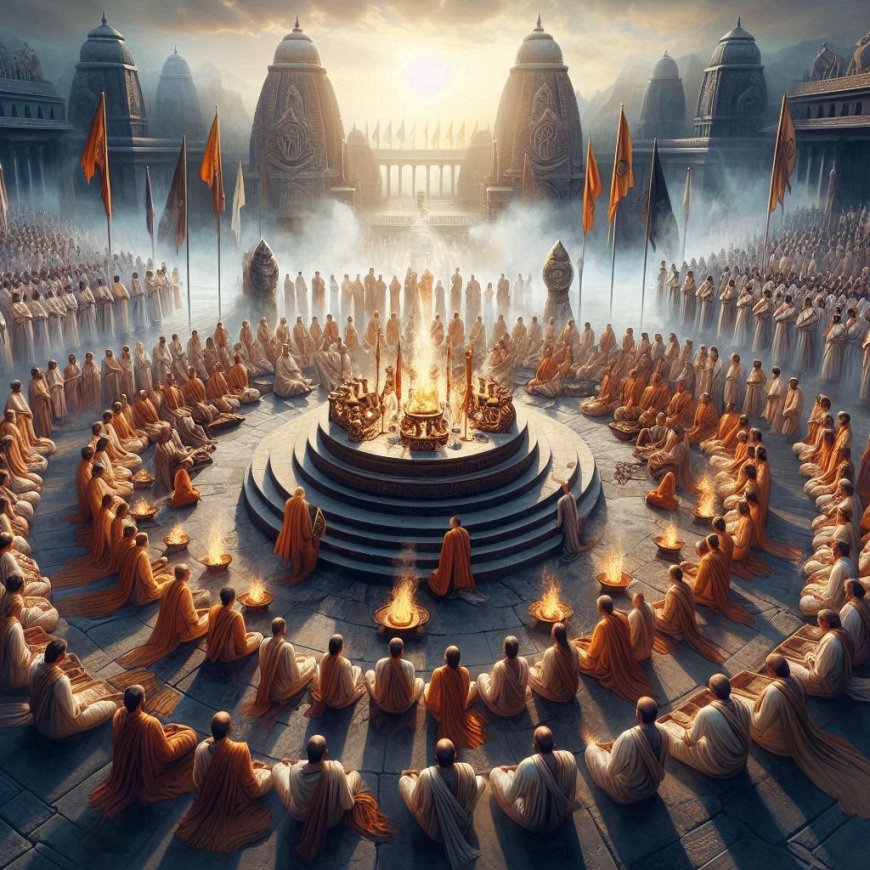
Shraddha Ceremony (Source: Personal Collection)
After the cries and deep sorrow that shook the heart, the Pandavas decided to hold a religious ritual to soothe the souls of the soldiers who had fallen in battle. Yudhishthira, as the leader of the Pandavas, was filled with guilt. Even though they won the war, in his heart, Yudhishthira knew that this victory came at too great a price more suffering than true happiness could ever provide. Krishna, Bhishma, and the rishis, with their wisdom, guided Yudhishthira to perform the Shraddha ceremony, a ritual worship to appease the spirits of the fallen heroes. In a solemn atmosphere, the Pandavas gathered, offering sacred prayers, paying their final respects to their brothers and the fallen warriors. The ceremony became a symbol reminding them all that behind the victory lay wounds that would never heal.




